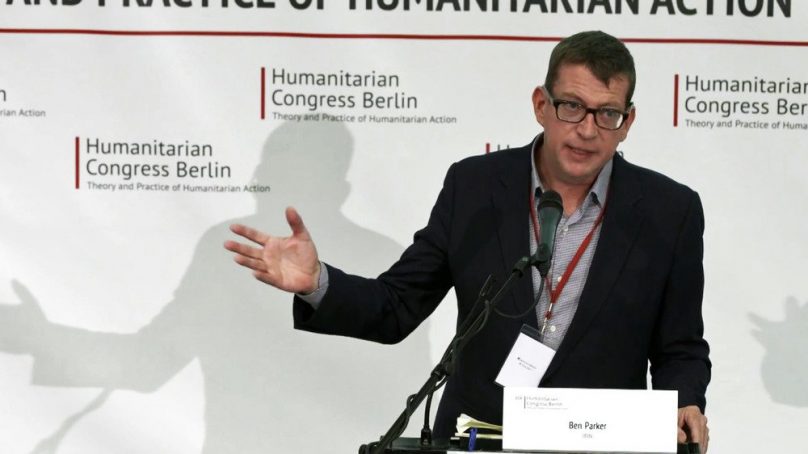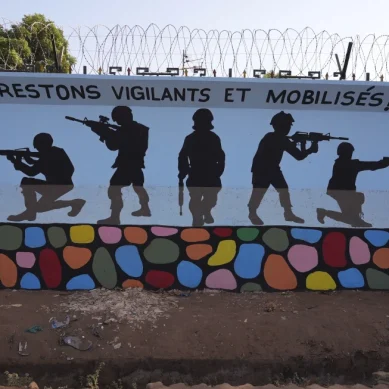
You might think that reporting on humanitarian issues is like any other kind of journalism. But after years of being both an aid worker and a reporter at The New Humanitarian, (and before that, IRIN News), I think it has a special set of rewards and difficulties.
First, the international aid apparatus is messy, opaque and hard to decode.
I have often tried to argue that the aid industry is particularly hard to report on: Its jargon is beyond parody; its transparency is uneven at best, and the end-customers – the people who need a bit of help at a rough time in their lives – have the least power in a complex web of institutions and money flows.
Also people are very reluctant to talk. If you were reporting a different beat, in politics and business, for instance, competitors keep each other on their toes: One space rocket company might be happy to spill the beans on another as part of an epic battle of phallic late capitalism.
We don’t get that from aid workers so much. They fear for their jobs, yes, but they also worry about contagion: If they blow the whistle on a bad project, they may bring down the agency or the projects that are doing good work. Where the reporting is about aid from a rich country, there’s often an aid-sceptical press eager to jump in.
Then “charities” all get lumped together. The crash in Oxfam’s reputation dragged down others, so the argument goes – best let sleeping dogs lie. This thinking makes fertile ground for impunity.
Aid bureaucrats too have little to gain from poor projects being exposed in public – donor officials in northern capitals generally want to keep the aid flowing. Admitting aid went missing or misconduct was overlooked will, they fear, only strengthen the hand of those who want to squeeze aid budgets further, throwing the baby out with the bathwater.
The aid industry is murky, and tight-lipped. And as well as having limited journalistic scrutiny, it generally lacks the checks and balances that customers, shareholders or voters provide to other sectors of society. Instead, its “stakeholders” – a favourite bit of aidspeak – lack power or their incentives to do better are misaligned. A business that fails its customers will go bust. An incompetent government may be voted out or overthrown. But aid projects and aid agencies can be relentlessly mediocre but still survive.
That makes good humanitarian journalism all the more important – because other restraints are largely not there. What should it entail?
We have dragged, kicking and screaming, the failings of some very large institutions into the light. But it’s not all hit jobs. Reporting fairly, but critically, on the humanitarian world is what we do at The New Humanitarian. We’ve looked at successes and failures, innovations and reforms. We welcome healthy reflections and thoughtful analyses.
We know that how we publish matters, as well as what we produce. We try to maintain a self-critical awareness of what biases, privileges and perspectives we may need to check.
Getting the coverage right requires patience and persistence to make insider-y material accessible to regular readers, but not oversimplify. Crafting every piece is a balancing act.
The drivers of extreme human suffering are appalling but banal: accounts of humans’ inhumanity to humans can be oddly blah. The subject is naturally depressing and skippable for a reader far away. We do this work all the time and still it is infuriatingly hard to find a way to frame and convey all-too-familiar stories of dispossession and deprivation.
The subject matter is heavy-going, the surrounding economy and ecosystem is warped, and of course commercial sponsors and advertisers systematically avoid bad news (as we reported).
Humanitarian news feels a particularly important beat to me and yet it’s a strangely lonely one too – few news organisations dedicate resources to it as a niche.
While humanitarian crises are literally life and death, the experience of regular people is often a side-bar to political or military journalism.
Humanitarian issues are not a sidebar to the story when they happen to you. Covid-19 and climate change are a blunt reminder of that. When it hits close to home, of course people do care about vaccines, or disaster financing, or flood prevention.
It may be too often couched in horrible aid-speak but this stuff matters, and is central to navigating the climate emergency and global instability in the coming years.
Done well, journalism about crises can do a lot. It can remove an excuse for inaction; politicians can’t say they didn’t know or weren’t warned. It can arm the public and decision-makers with facts, analysis and context they can use – in whatever way they choose. It can rekindle some fellow-feeling and solidarity between different people, alienated or languishing on opposite sides of the planet. And those whose job it is to save lives can be held to account.
Done badly, reporting on humanitarian crises can be exploitative and offensive, a fount of lazy and racist tropes; even schadenfreude – pleasure derived by someone from another person’s misfortune – dressed up as pity.
Reporting on the aid industry can lurch between boosting or bashing: “AI will solve world hunger!” or “Aid workers caught being wasteful and useless, again” – and not much in between.
I’m leaving this job with a sense of pride in what this team has done and continues to achieve, and as convinced as ever of its importance. I’ll miss the pace, wit, snark and memes, brains and integrity of my colleagues. I’ll miss the thrill of investigations and data discoveries I’ve been lucky enough to work on. I salute and emoji fist-bump all the TNH team and contributors, and especially the sources and whistle-blowers who have trusted us with painful and risky but vital material.
I’m confident the journalism at The New Humanitarian will continue to come up with new framing, new tools, new ways to renew empathy, outrage and critical thinking about the way we deal with crises, and the way we hear about them. I’ll be cheering you on, and glad you’re keeping watch.
- The New Humanitarian /Opinion/ Ben Parker











